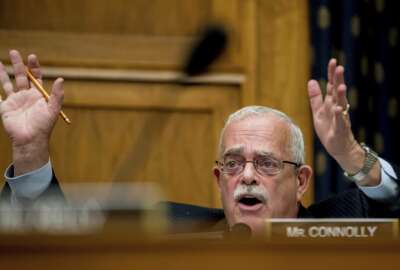Best listening experience is on Chrome, Firefox or Safari. Subscribe to Federal Drive’s daily audio interviews on Apple Podcasts or PodcastOne
The delays have gotten so bad with the transition to the new unique entity identifier (UEI) on SAM.gov that the Defense Department isn’t requiring contractors to have a new number to do business with them for the next six weeks.
The Defense Pricing and Contracting office issued a deviation to the Federal Acquisition Regulation (FAR) on Sept. 8 that allows the services and defense agencies to do business with companies who aren’t fully registered in the governmentwide acquisition system.
The deviation stated that contracting officers can apply a section of the FAR that lets them to move forward with an acquisition “when an offeror can prove it has initiated or attempted to start the SAM registration process. These procedures allow the offeror to not be actively registered in SAM until 30 days after award or the date of its first invoice, whichever comes first.”
The decision by DoD to work with companies who are not fully registered in SAM.gov comes five months after the General Services Administration began the transition to UEI from Duns and Bradstreet numbers.
The UEI is a 12-character alphanumeric identifier that is owned and managed by the government. It connects agencies and companies throughout the federal award lifecycle, whether it’s writing a contract or managing a grant.
Companies continue to face delays in completing the transition because of problems with GSA’s new system. Industry associations and companies said in July the problems ranged from obtaining a UEI number to a lack of clear and urgent response from GSA to long wait times at the call center.
Rep. Gerry Connolly (D-Va.), chairman of the Oversight and Reform Subcommittee on Government Operations, asked GSA for a briefing in July about the problems with the UEI transition.
A House source confirmed GSA has been in discussions with Connolly’s staff and have been helpful in addressing problems companies have been facing.
“[M]ore needs to be done. We are working to schedule a more comprehensive briefing to discuss a solution to this issue,” the source said.
In the meantime, DoD says contracting officers can move forward without a finalized SAM.gov registration through Oct. 31.
“This deviation is issued to mitigate delays in SAM registration currently being experienced by entities due to changes in entity validation processes and a significant increase in entities requesting a unique entity identifier at SAM,” the memo stated. “Because of the potential negative effects that can result in contract performance and administration processes due to lack of an active SAM registration, contracting officers are cautioned to apply this deviation thoughtfully on a case-by-case basis as the acquisition strategy and internal contracting business processes allow.”
In the memo, John Tenaglia, director of Defense Pricing and Contracting, outlined seven requirements for contracting officers who use this authority
Among the steps acquisition workers must take are:
- Use a copy of the ticket (with ticket number and date) the offeror has submitted to SAM’s Federal Service Desk (FSD) as the offeror’s proof of its initiation or attempt to start the SAM registration process;
- If using the Procurement Integrated Enterprise Environment (PIEE) solicitation module to receive offers, ensure an alternate method is provided for offerors to submit their proposals or quotes (e.g., an email address), as the PIEE solicitation module requires the offeror be actively registered in SAM in order to submit a proposal or quote through the module;
- Monitor the contractor’s completion of registration as soon as possible after award to ensure contract performance, administration, receipt and invoicing processes are not impacted; and
- Delay reporting the award to the Federal Procurement Data System until the contractor is actively registered in SAM so the contract action report will not fail processing.
GSA is holding a question and answer session about the UEI transition on Sept. 14. It will be their third session since delays began earlier this summer.
Copyright
© 2024 Federal News Network. All rights reserved. This website is not intended for users located within the European Economic Area.
 First Look
First Look  First Look
First Look